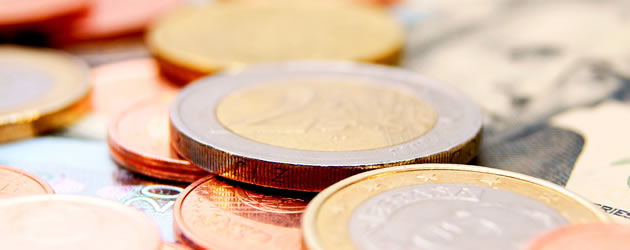
The Pound to US Dollar exchange rate (GBP/USD) declined by around 2.0 cents yesterday as markets reacted to a dovish policy statement from the Bank of England. The Euro also suffered from some verbal intervention as the European Central Bank signalled that interest rates would remain low for an “extended period of time”. The Euro to US Dollar exchange rate (EUR/USD) fell by a cent in response to the ECB’s statement.
In the run-up to yesterday’s BoE announcement the Pound had performed admirably well as a trio of positive PMI results – Manufacturing, Construction and Services – reflected exceedingly well on the British economy. Due to the impressive UK Purchasing Managers Indexes, the majority of market-players were expecting the Bank of England to withhold from further stimulus at this juncture. Duly the UK Central Bank obliged: maintaining its current record low benchmark interest rate of 0.50% and holding the asset purchasing target steady at £375 billion.
However, the BoE, with Mark Carney onboard for the first time, threw a spanner in the works by releasing a policy statement – usually statements are only issued when changes to monetary policy have been made.
The statement verged on forward guidance as the Central Bank noted that interest rate rises were not “warranted by the recent developments in the domestic economy”. The BoE stated that although CPI inflation has been running above-target for a long time, and is set to rise further over the next few months, medium-term inflation prospects remain anchored inline with the bank’s 2% target. Markets interpreted this as negative for the Pound because it suggested that the BoE is still looking to introduce further quantitative easing measures at some point in the future.
The Pound’s positive momentum was derailed in response to the overtly dovish BoE statement and Sterling suffered a series of major declines against its currency rivals: GBP/CAD shed -2.0 cents, GBP/AUD lost -3.5 cents and GBP/NZD fell -4.2 cents.
Sterling also slid by around a cent against the Euro, but GBP/EUR’s losses could have been worse had it not been for a slice of dovish cake from the ECB.
Like the Bank of England, the European Central Bank left monetary policy unchanged: 0.50% benchmark interest rate and 0.0% deposit rate. However, the single currency was undone by comments from ECB Chief Mario Draghi suggesting that ultra-low interest rates will continue for a “prolonged period of time”. Draghi said that discussions had taken place regarding further interest rate reductions and this caused traders to sell the Euro in anticipation of lower yield returns in the future.
The single currency declined by -0.8 cents against the US Dollar, -1.1 cents against the Canadian Dollar, -2.0 cents against the Australian Dollar and -2.3 cents against the New Zealand Dollar.
Later on today the latest US Non-farm Payrolls report is expected to come in at 165,000, which is unlikely to influence the Federal Reserve to begin its regime of asset purchase tapering. However, the US ADP Employment figure printed above-target earlier this week at 188,000 compared to forecasts of 160,000 and this could bode well for the US labour market. If the Non-farms figure comes in better-than-anticipated it is possible that GBP/USD could fall closer towards significant psychological support at 1.5000.

Comments are closed.